Abstract
There are two ways to find the cause of primary immunodeficiency diseases. One approach is to start with the immune defect and work backwards, using in vitro techniques to define where the primary abnormality lies in the immune response. Immunologists favour this approach for obvious reasons; and it is not without virtue since, for example, it has shown that the defect in most cases of primary hypogammaglobulinaemia is due to a failure of B lymphocyte maturation. The alternative approach is to screen empirically for defects in biochemical pathways in the hope of finding a clue which will eventually lead to the underlying disorder. This is a sensible approach in diseases which are clearly inherited (e.g. X-linked hypogammaglobulinaemia) but is less attractive in a disease such as late onset hypogammaglobulinaemia which is not obviously inherited. In practice, such procedures involve screening the urine for abnormalities in the quality or quantity of excreted compounds. Another way is to screen for abnormalities in organelle integrity by measuring the activity of various enzymes in subcellular fractions. In reality, the clue to the metabolic defect is usually discovered by accident, the prime example in our field being the discovery of adenosine deaminase (ADA) deficiency.
Full text
PDF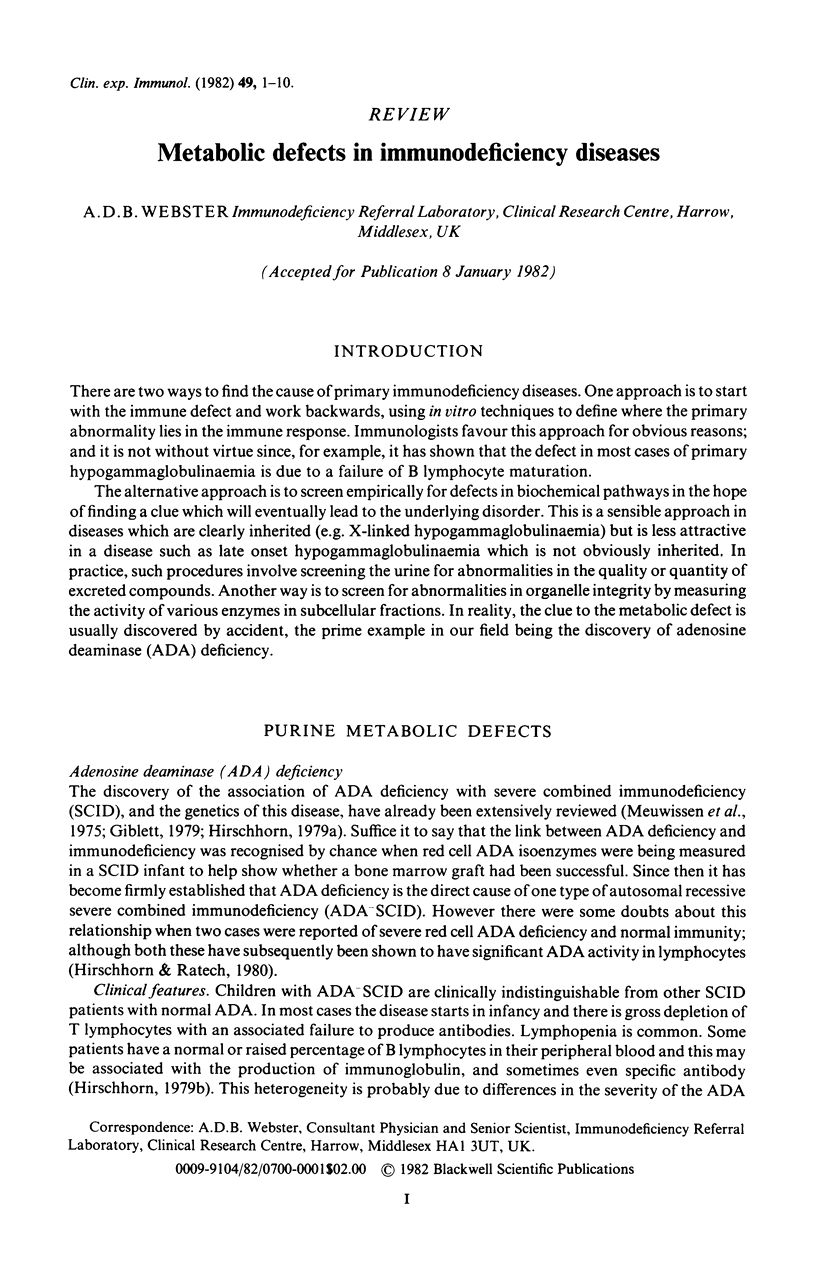
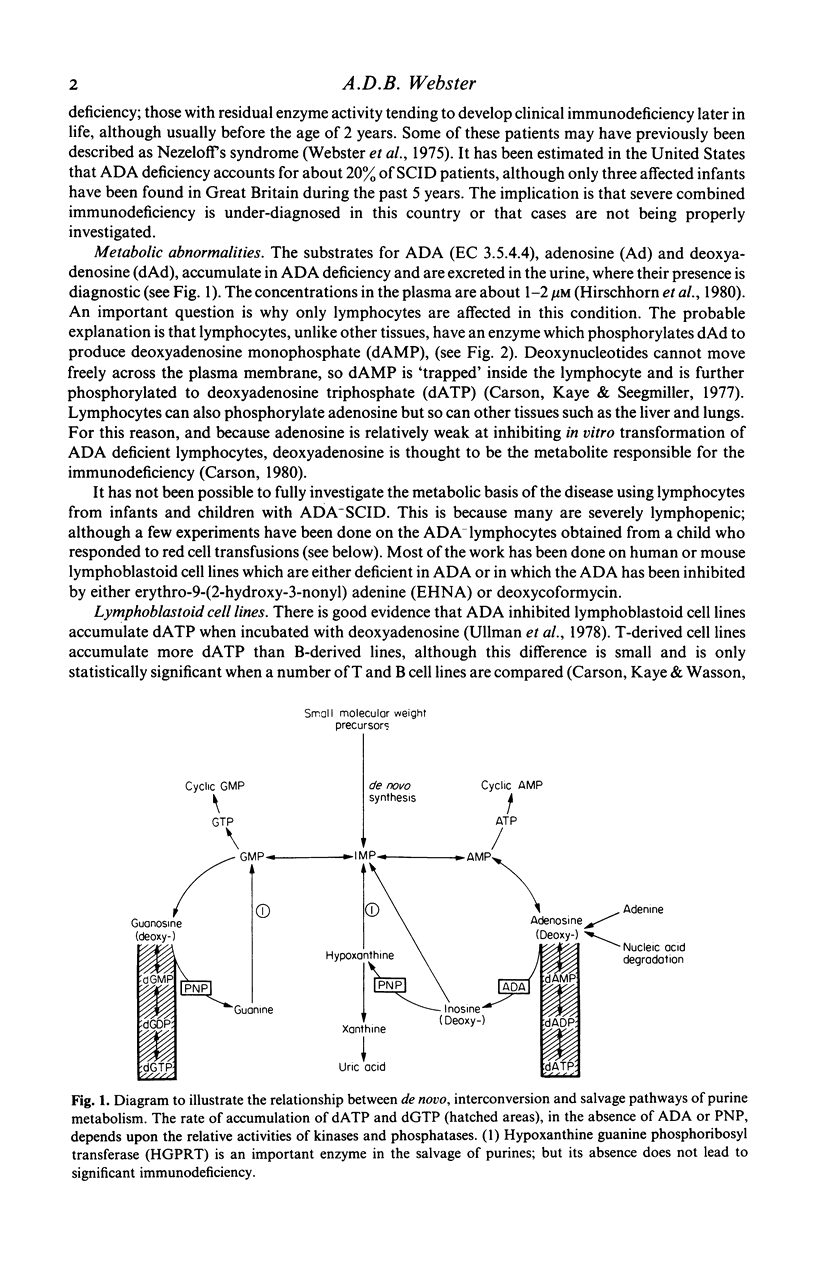
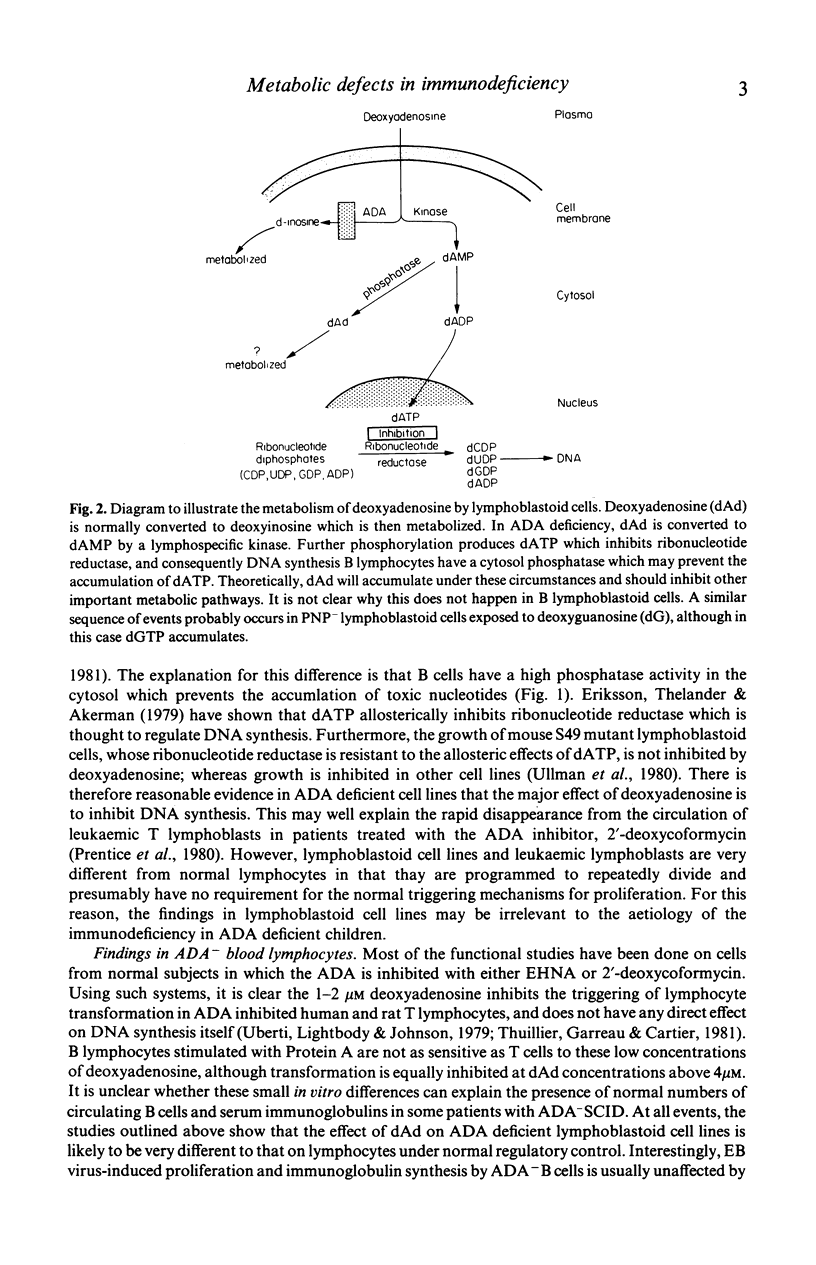
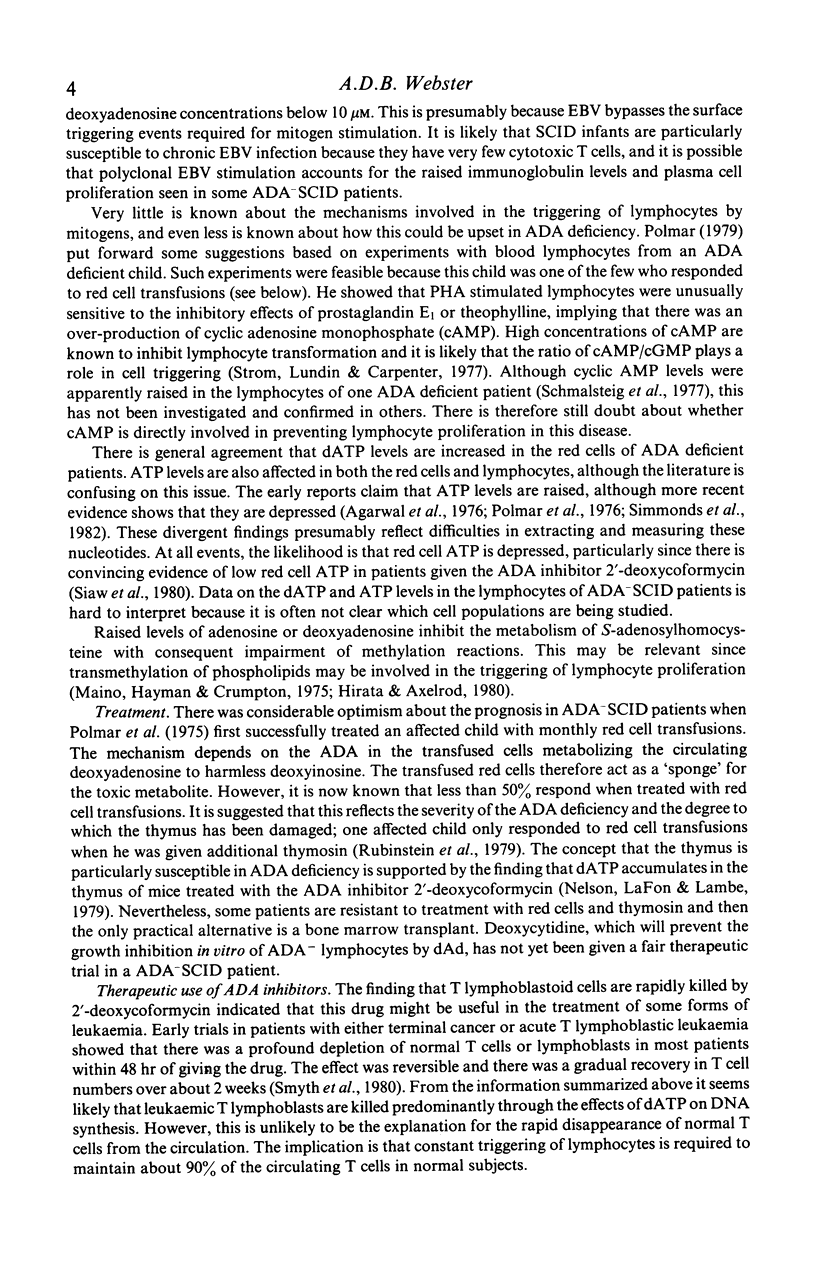
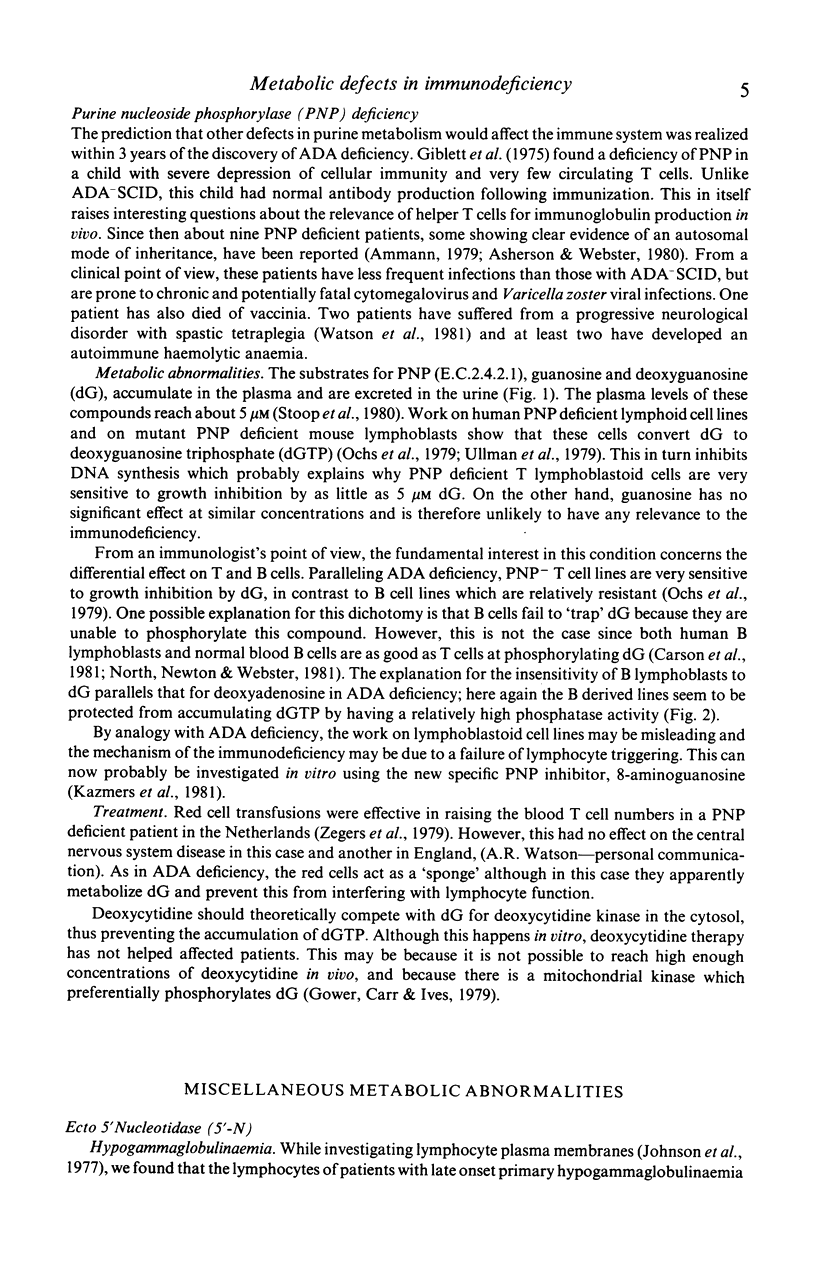
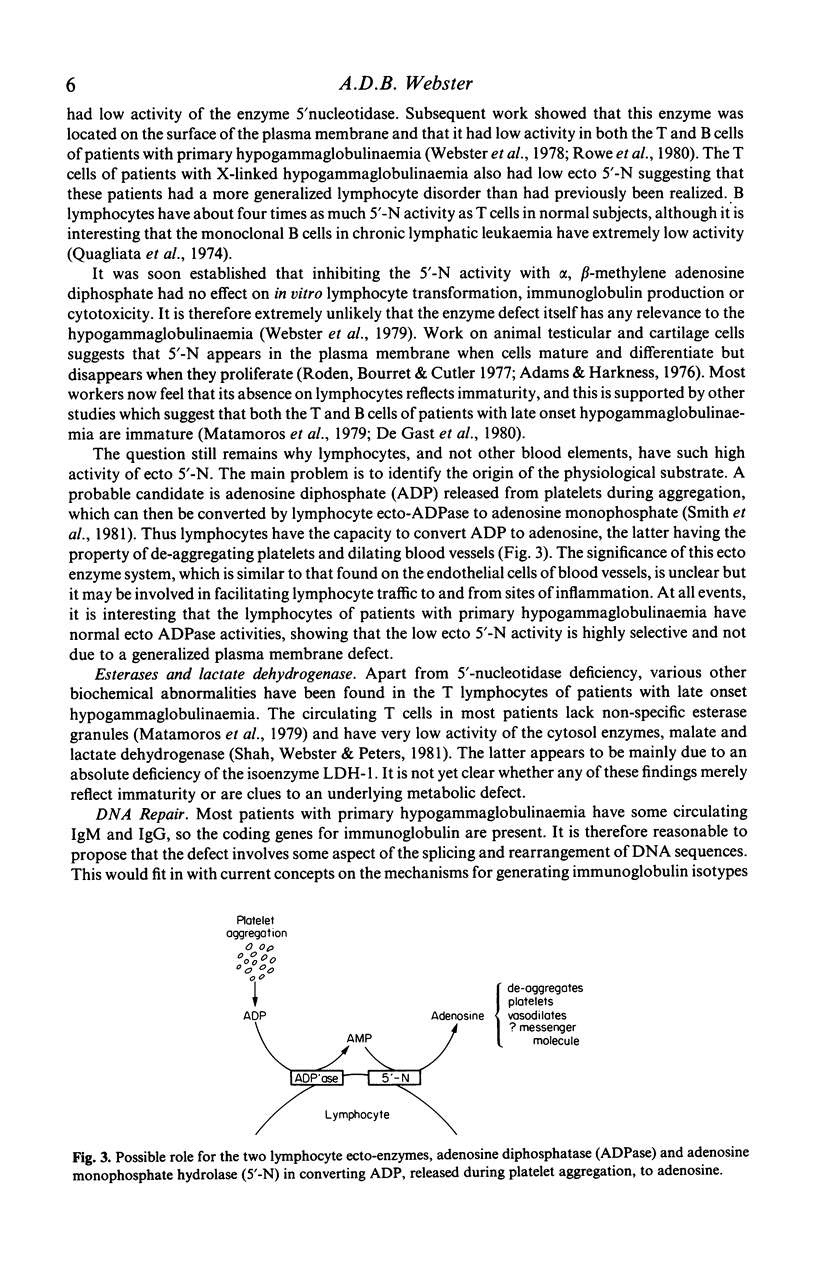
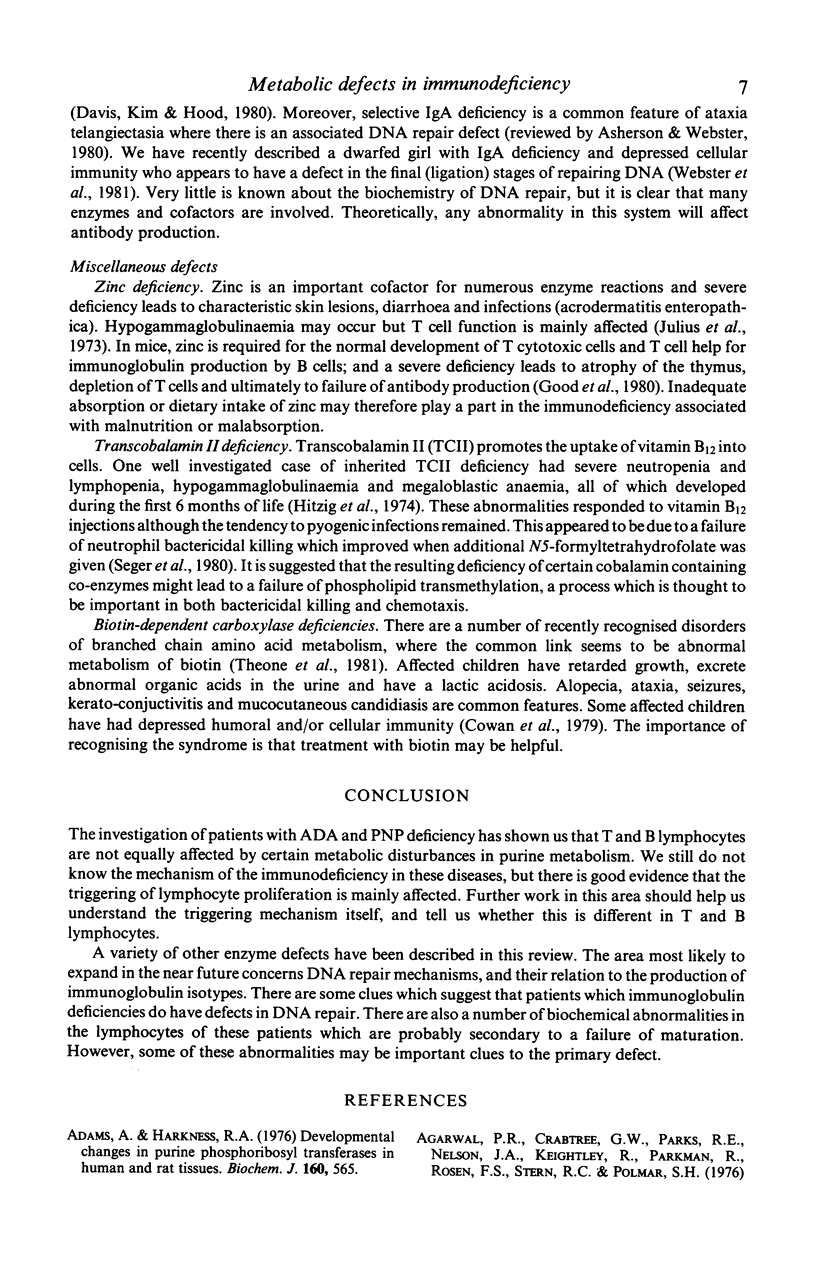
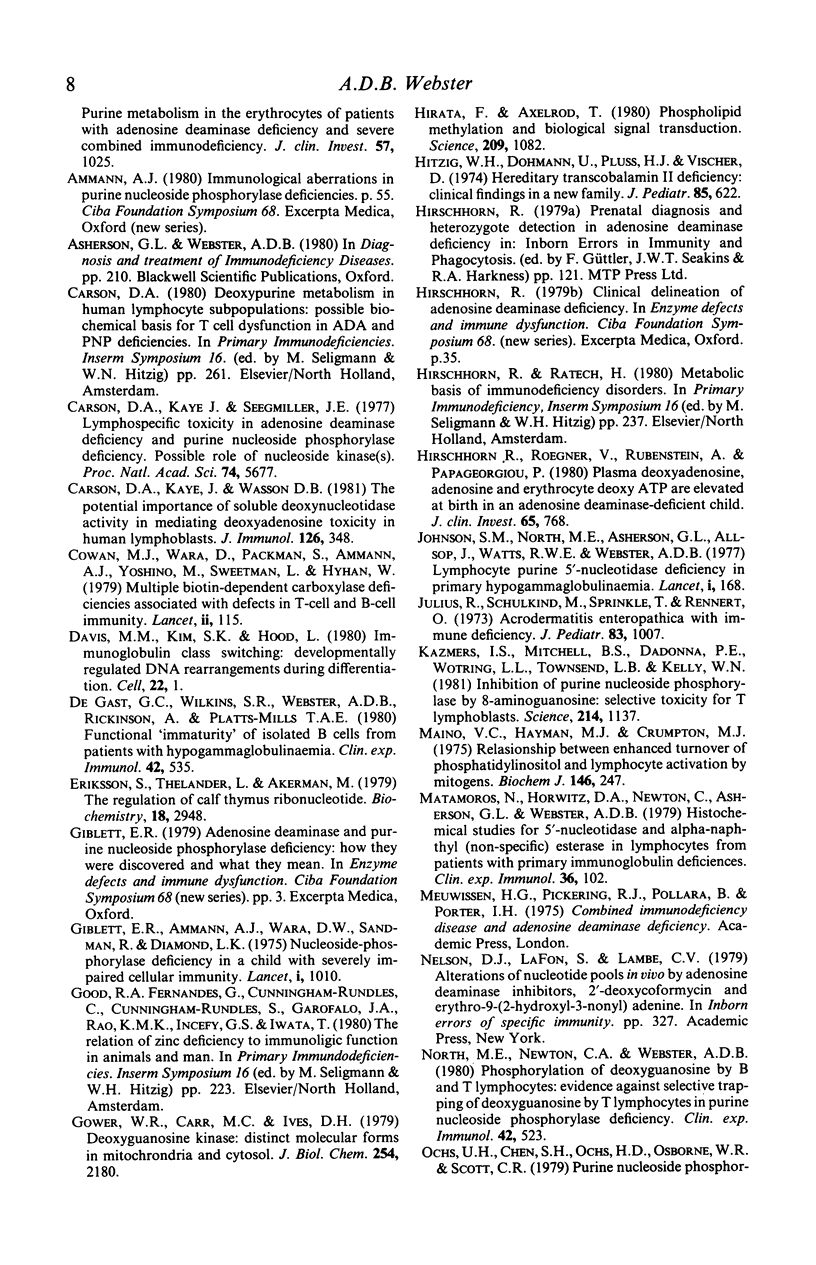
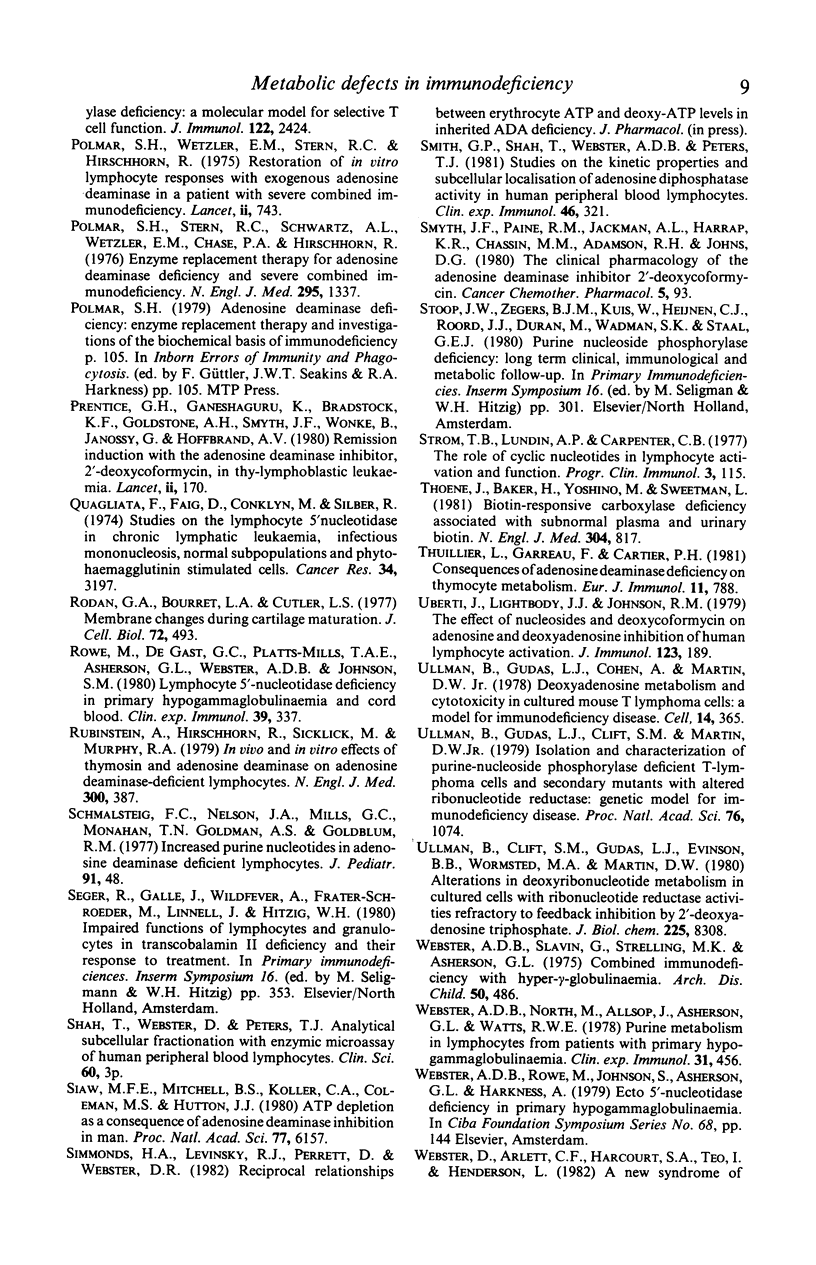
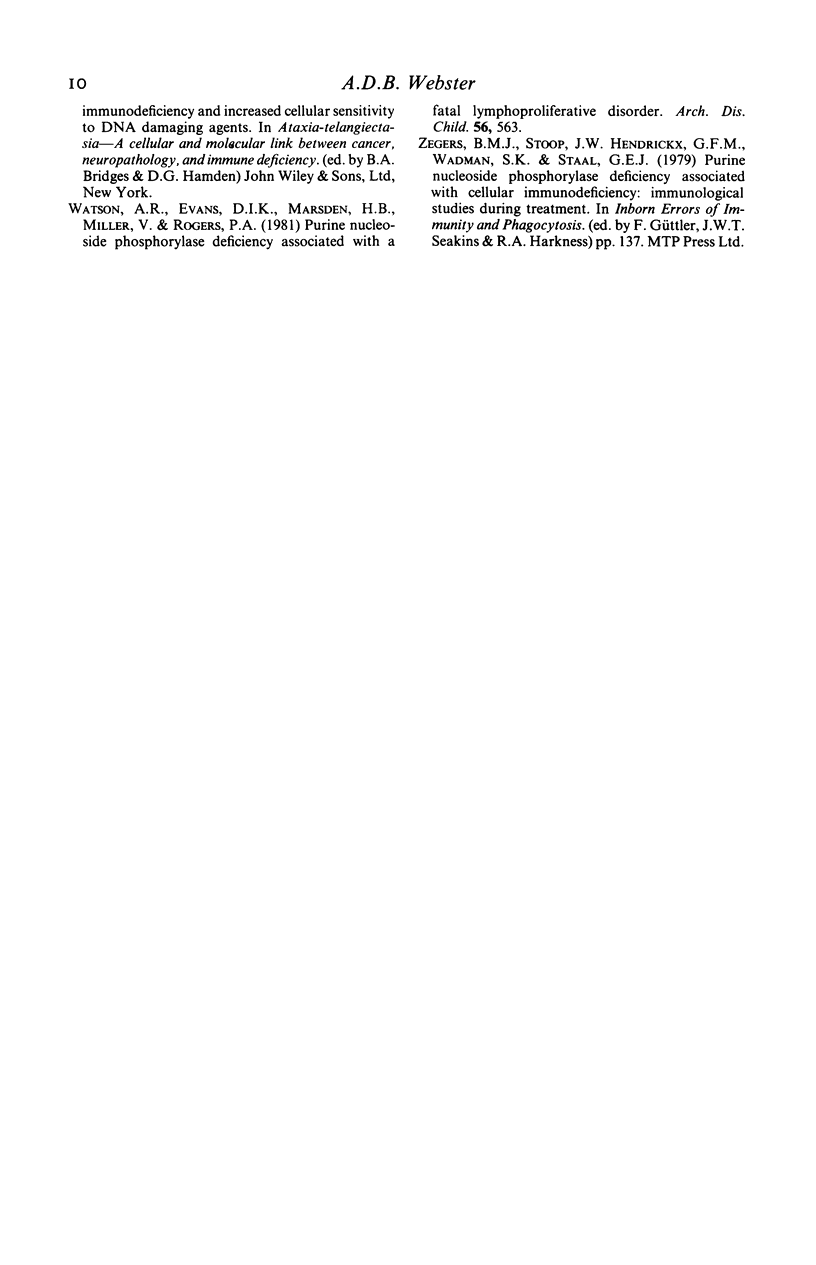
Selected References
These references are in PubMed. This may not be the complete list of references from this article.
- Adams A., Harkness R. A. Developmental changes in purine phosphoribosyltransferases in human and rat tissues. Biochem J. 1976 Dec 15;160(3):565–576. doi: 10.1042/bj1600565. [DOI] [PMC free article] [PubMed] [Google Scholar]
- Agarwal R. P., Crabtree G. W., Parks R. E., Jr, Nelson J. A., Keightley R., Parkman R., Rosen F. S., Stern R. C., Polmar S. H. Purine nucleoside metabolism in the erythrocytes of patients with adenosine deaminase deficiency and severe combined immunodeficiency. J Clin Invest. 1976 Apr;57(4):1025–1035. doi: 10.1172/JCI108344. [DOI] [PMC free article] [PubMed] [Google Scholar]
- Carson D. A., Kaye J., Seegmiller J. E. Lymphospecific toxicity in adenosine deaminase deficiency and purine nucleoside phosphorylase deficiency: possible role of nucleoside kinase(s). Proc Natl Acad Sci U S A. 1977 Dec;74(12):5677–5681. doi: 10.1073/pnas.74.12.5677. [DOI] [PMC free article] [PubMed] [Google Scholar]
- Carson D. A., Kaye J., Wasson D. B. The potential importance of soluble deoxynucleotidase activity in mediating deoxyadenosine toxicity in human lymphoblasts. J Immunol. 1981 Jan;126(1):348–352. [PubMed] [Google Scholar]
- Cowan M. J., Wara D. W., Packman S., Ammann A. J., Yoshino M., Sweetman L., Nyhan W. Multiple biotin-dependent carboxylase deficiencies associated with defects in T-cell and B-cell immunity. Lancet. 1979 Jul 21;2(8134):115–118. doi: 10.1016/s0140-6736(79)90002-3. [DOI] [PubMed] [Google Scholar]
- Davis M. M., Kim S. K., Hood L. Immunoglobulin class switching: developmentally regulated DNA rearrangements during differentiation. Cell. 1980 Nov;22(1 Pt 1):1–2. doi: 10.1016/0092-8674(80)90145-2. [DOI] [PubMed] [Google Scholar]
- De Gast G. C., Wilkins S. R., Webster A. D., Rickinson A., Platts-Mills T. A. Functional 'immaturity' of isolated B cells from patients with hypogammaglobulinaemia. Clin Exp Immunol. 1980 Dec;42(3):535–544. [PMC free article] [PubMed] [Google Scholar]
- Engström Y., Eriksson S., Thelander L., Akerman M. Ribonucleotide reductase from calf thymus. Purification and properties. Biochemistry. 1979 Jul 10;18(14):2941–2948. doi: 10.1021/bi00581a004. [DOI] [PubMed] [Google Scholar]
- Giblett E. R., Ammann A. J., Wara D. W., Sandman R., Diamond L. K. Nucleoside-phosphorylase deficiency in a child with severely defective T-cell immunity and normal B-cell immunity. Lancet. 1975 May 3;1(7914):1010–1013. doi: 10.1016/s0140-6736(75)91950-9. [DOI] [PubMed] [Google Scholar]
- Gower W. R., Jr, Carr M. C., Ives D. H. Deoxyguanosine kinase. Distinct molecular forms in mitochondria and cytosol. J Biol Chem. 1979 Apr 10;254(7):2180–2183. [PubMed] [Google Scholar]
- Hirata F., Axelrod J. Phospholipid methylation and biological signal transmission. Science. 1980 Sep 5;209(4461):1082–1090. doi: 10.1126/science.6157192. [DOI] [PubMed] [Google Scholar]
- Hirschhorn R., Roegner V., Rubinstein A., Papageorgiou P. Plasma deoxyadenosine, adenosine, and erythrocyte deoxyATP are elevated at birth in an adenosine deaminase-deficient child. J Clin Invest. 1980 Mar;65(3):768–771. doi: 10.1172/JCI109725. [DOI] [PMC free article] [PubMed] [Google Scholar]
- Hitzig W. H., Dohmann U., Pluss H. J., Vischer D. Hereditary transcobalamin II deficiency: clinical findings in a new family. J Pediatr. 1974 Nov;85(5):622–628. doi: 10.1016/s0022-3476(74)80503-2. [DOI] [PubMed] [Google Scholar]
- Johnson S. M., North M. E., Asherson G. L., Allsop J., Watts R. W., Webster A. D. Lymphocyte purine 5'-nucleotidase edficiency in primary hypogammaglobulinaemia. Lancet. 1977 Jan 22;1(8004):168–170. doi: 10.1016/s0140-6736(77)91765-2. [DOI] [PubMed] [Google Scholar]
- Julius R., Schulkind M., Sprinkle T., Rennert O. Acrodermatitis enteropathica with immune deficiency. J Pediatr. 1973 Dec;83(6):1007–1011. doi: 10.1016/s0022-3476(73)80536-0. [DOI] [PubMed] [Google Scholar]
- Kazmers I. S., Mitchell B. S., Dadonna P. E., Wotring L. L., Townsend L. B., Kelley W. N. Inhibition of purine nucleoside phosphorylase by 8-aminoguanosine: selective toxicity for T lymphoblasts. Science. 1981 Dec 4;214(4525):1137–1139. doi: 10.1126/science.6795718. [DOI] [PubMed] [Google Scholar]
- Maino V. C., Hayman M. J., Crumpton M. J. Relationship between enhanced turnover of phosphatidylinositol and lymphocyte activation by mitogens. Biochem J. 1975 Jan;146(1):247–252. doi: 10.1042/bj1460247. [DOI] [PMC free article] [PubMed] [Google Scholar]
- Matamoros N., Horwitz D. A., Newton C., Asherson G. L., Webster A. D. Histochemical studies for 5'-nucleotidase and alpha-naphthyl (non-specific) esterase in lymphocytes from patients with primary immunoglobulin deficiencies. Clin Exp Immunol. 1979 Apr;36(1):102–106. [PMC free article] [PubMed] [Google Scholar]
- Ochs U. H., Chen S. H., Ochs H. D., Osborne W. R., Scott C. R. Purine nucleoside phosphorylase deficiency: a molecular model for selective loss of T cell function. J Immunol. 1979 Jun;122(6):2424–2429. [PubMed] [Google Scholar]
- Polmar S. H., Stern R. C., Schwartz A. L., Wetzler E. M., Chase P. A., Hirschhorn R. Enzyme replacement therapy for adenosine deaminase deficiency and severe combined immunodeficiency. N Engl J Med. 1976 Dec 9;295(24):1337–1343. doi: 10.1056/NEJM197612092952402. [DOI] [PubMed] [Google Scholar]
- Polmar S. H., Wetzler E. M., Stern R. C., Hirschhorn R. Restoration of in-vitro lymphocyte responses with exogenous adenosine deaminase in a patient with severe combined immunodeficiency. Lancet. 1975 Oct 18;2(7938):743–746. doi: 10.1016/s0140-6736(75)90726-6. [DOI] [PubMed] [Google Scholar]
- Prentice H. G., Smyth J. F., Ganeshaguru K., Wonke B., Bradstock K. F., Janossy G., Goldstone A. H., Hoffbrand A. V. Remission induction with adenosine-deaminase inhibitor 2'-deoxycoformycin in Thy-lymphoblastic leukaemia. Lancet. 1980 Jul 26;2(8187):170–172. doi: 10.1016/s0140-6736(80)90060-4. [DOI] [PubMed] [Google Scholar]
- Quagliata F., Faig D., Conklyn M., Silber R. Studies on the lymphocyte 5'-nucleotidase in chronic lymphocytic leukemia, infectious mononucleosis, normal subpopulations, and phytohemagglutinin-stimulated cells. Cancer Res. 1974 Dec;34(12):3197–3202. [PubMed] [Google Scholar]
- Rodan G. A., Bourret L. A., Cutler L. S. Membrane changes during cartilage maturation. Increase in 5'-nucleotidase and decrease in adenosine inhibition of adenylate cyclase. J Cell Biol. 1977 Feb;72(2):493–501. doi: 10.1083/jcb.72.2.493. [DOI] [PMC free article] [PubMed] [Google Scholar]
- Rowe M., de Gast G. C., Platts-Mills T. A., Asherson G. L., Webster A. D., Johnson S. M. Lymphocyte 5'-nucleotidase in primary hypogammaglobulinaemia and cord blood. Clin Exp Immunol. 1980 Feb;39(2):337–343. [PMC free article] [PubMed] [Google Scholar]
- Rubinstein A., Hirschhorn R., Sicklick M., Murphy R. A. In vivo and in vitro effects of thymosin and adenosine deaminase on adenosine-deaminase-deficient lymphocytes. N Engl J Med. 1979 Feb 22;300(8):387–392. doi: 10.1056/NEJM197902223000802. [DOI] [PubMed] [Google Scholar]
- Siaw M. F., Mitchell B. S., Koller C. A., Coleman M. S., Hutton J. J. ATP depletion as a consequence of adenosine deaminase inhibition in man. Proc Natl Acad Sci U S A. 1980 Oct;77(10):6157–6161. doi: 10.1073/pnas.77.10.6157. [DOI] [PMC free article] [PubMed] [Google Scholar]
- Smith G. P., Shah T., Webster A. D., Peters T. J. Studies on the kinetic properties and subcellular localization of adenosine diphosphatase activity in human peripheral blood lymphocytes. Clin Exp Immunol. 1981 Nov;46(2):321–326. [PMC free article] [PubMed] [Google Scholar]
- Smyth J. F., Paine R. M., Jackman A. L., Harrap K. R., Chassin M. M., Adamson R. H., Johns D. G. The clinical pharmacology of the adenosine deaminase inhibitor 2'-deoxycoformycin. Cancer Chemother Pharmacol. 1980;5(2):93–101. doi: 10.1007/BF00435411. [DOI] [PubMed] [Google Scholar]
- Strom T. B., Lundin A. P., Carpenter C. B. The role of cyclic nucleotides in lymphocyte activation and function. Prog Clin Immunol. 1977;3:115–153. [PubMed] [Google Scholar]
- Thoene J., Baker H., Yoshino M., Sweetman L. Biotin-responsive carboxylase deficiency associated with subnormal plasma and urinary biotin. N Engl J Med. 1981 Apr 2;304(14):817–820. doi: 10.1056/NEJM198104023041404. [DOI] [PubMed] [Google Scholar]
- Thuillier L., Garreau F., Cartier P. H. Consequences of adenosine deaminase deficiency on thymocyte metabolism. Eur J Immunol. 1981 Oct;11(10):788–794. doi: 10.1002/eji.1830111010. [DOI] [PubMed] [Google Scholar]
- Uberti J., Lightbody J. J., Johnson R. M. The effect of nucleosides and deoxycoformycin on adenosine and deoxyadenosine inhibition of human lymphocyte activation. J Immunol. 1979 Jul;123(1):189–193. [PubMed] [Google Scholar]
- Ullman B., Clift S. M., Gudas L. J., Levinson B. B., Wormsted M. A., Martin D. W., Jr Alterations in deoxyribonucleotide metabolism in cultured cells with ribonucleotide reductase activities refractory to feedback inhibition by 2'-deoxyadenosine triphosphate. J Biol Chem. 1980 Sep 10;255(17):8308–8314. [PubMed] [Google Scholar]
- Ullman B., Gudas L. J., Clift S. M., Martin D. W., Jr Isolation and characterization of purine-nucleoside phosphorylase-deficient T-lymphoma cells and secondary mutants with altered ribonucleotide reductase: genetic model for immunodeficiency disease. Proc Natl Acad Sci U S A. 1979 Mar;76(3):1074–1078. doi: 10.1073/pnas.76.3.1074. [DOI] [PMC free article] [PubMed] [Google Scholar]
- Ullman B., Gudas L. J., Cohen A., Martin D. W., Jr Deoxyadenosine metabolism and cytotoxicity in cultured mouse T lymphoma cells: a model for immunodeficiency disease. Cell. 1978 Jun;14(2):365–375. doi: 10.1016/0092-8674(78)90122-8. [DOI] [PubMed] [Google Scholar]
- Watson A. R., Evans D. I., Marsden H. B., Miller V., Rogers P. A. Purine nucleoside phosphorylase deficiency associated with a fatal lymphoproliferative disorder. Arch Dis Child. 1981 Jul;56(7):563–565. doi: 10.1136/adc.56.7.563. [DOI] [PMC free article] [PubMed] [Google Scholar]
- Webster A. D., North M., Allsop J., Asherson G. L., Watts R. W. Purine metabolism in lymphocytes from patients with primary hypogammaglobulinaemia. Clin Exp Immunol. 1978 Mar;31(3):456–463. [PMC free article] [PubMed] [Google Scholar]
- Webster A. D., Slavin G., Strelling M. K., Asherson G. L. Combined immunodeficiency with hyper-gamma-globulinaemia. Arch Dis Child. 1975 Jun;50(6):486–490. doi: 10.1136/adc.50.6.486. [DOI] [PMC free article] [PubMed] [Google Scholar]


